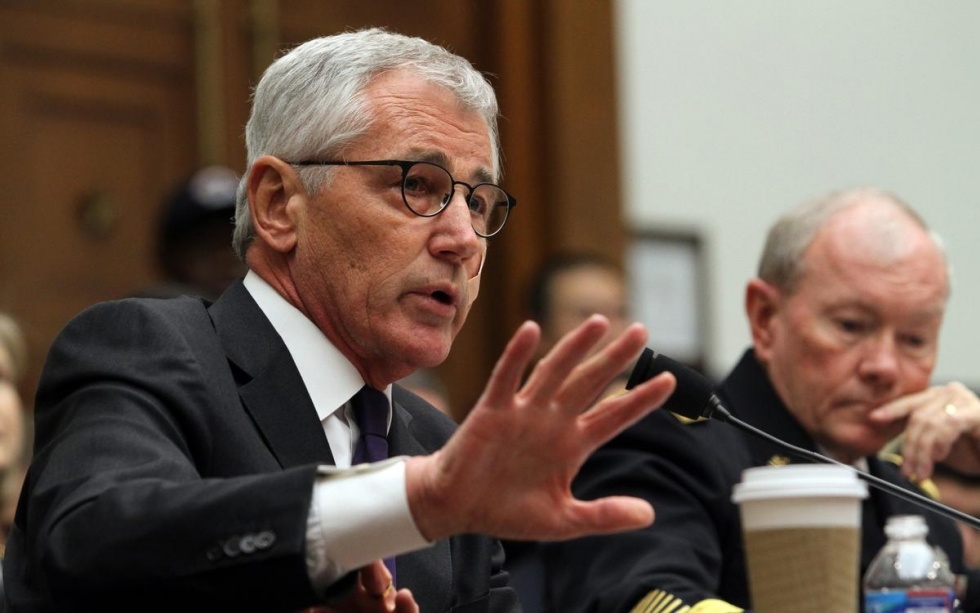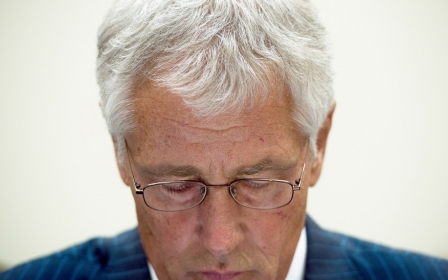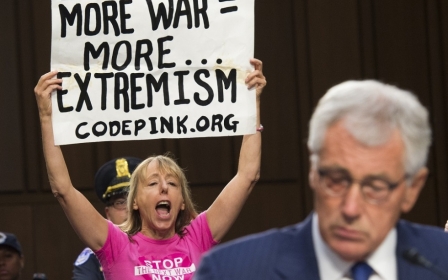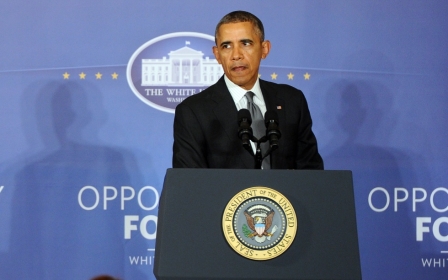US Syria policy among reasons why Hagel resigned: experts

US Secretary of Defence Chuck Hagel’s resignation Monday may have been due to differences with President Barack Obama over his administration's policy on Syria, experts said.
The move follows tensions between Hagel and the rest of Obama’s national security team, particularly National Security Advisor Susan Rice.
"US media report there was increasing tension between Mr Hagel and the administration over decisions in Syria and working styles, citing Hagel confidantes and senior defence officials," the BBC reported.
Hagel had disagreed with the administration's approach to Syria, writing a two-page memo arguing for a more assertive stance towards President Bashar al-Assad, his aides recently disclosed.
Hagel reportedly sent the memo to Rice in October in which he asked the administration to clarify its Syria policy, drawing ire from the White House.
Mark Perry, an independent defence and foreign policy analyst, said that Hagel was likely forced out of office due to tensions with Rice.
"Chuck Hagel didn’t want to continue to take orders from Susan Rice, and that’s when this started," he said, adding that Obama "rewards loyalty."
"That’s why we have the national security staff in place that we have, and that’s why Hagel is being shown the door, because Hagel raised too many questions about the policy – like what is the policy?," he said referring to the Obama administration’s Syria policy.
Signalling that the defence chief was not afraid to speak his mind behind closed doors, Obama said that Hagel had always “given it to me straight.”
"When it mattered most, behind closed doors, in the Oval Office, you’ve always given it to me straight, and for that I will always be grateful," the president said during a joint press conference to announce the resignation.
That difference in opinion may have reached a critical point in recent months.
He was also reportedly against the July 2013 military overthrow of Egypt's first democratically elected president Mohamed Morsi, but the Obama administration refused to call a coup.
Hagel’s resignation follows several high-profile departures of senior officials who were critical of the administration’s policy.
Former Secretary of State Hilary Clinton, Syria ambassador Robert Ford, and Fred Hof, the administration's former point person on Syria, all parted ways with the administration following differences over administration policy.
Although administration officials indicated Hagel had been pressured to resign, a senior national security staff member in Congress told AFP that was not the case.
"Hagel quit," the aide said. "Hagel found himself at odds with the administration."
As is the case when a cabinet member resigns, Hagel's move has fuelled speculation about who will succeed him. The most likely candidate is Michelle Flournoy who served as under-secretary of defence for policy in the Obama administration from 2009-2012. She is currently the chief executive officer of the Centre for a New American Security, which she co-founded.
Other contenders include former Deputy Secretary of Defence Ash Carter and Bob Work, who currently holds the post.
Perry said that regardless of who assumes the Pentagon’s top spot, that person will have his or her work cut out.
"Whoever the secretary of defence is, is given a nearly impossible job of running a Defence Department that is operating under severe budget handicaps at a time of expanded national security threats in an administration that is not united in their views, and a military that is wondering where the next war is going to be," he said.
Even so, the next defence chief is unlikely to be confirmed before the Republican-led Senate convenes in January.
New MEE newsletter: Jerusalem Dispatch
Sign up to get the latest insights and analysis on Israel-Palestine, alongside Turkey Unpacked and other MEE newsletters
Middle East Eye delivers independent and unrivalled coverage and analysis of the Middle East, North Africa and beyond. To learn more about republishing this content and the associated fees, please fill out this form. More about MEE can be found here.




